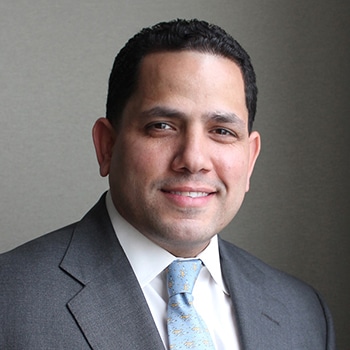Advice for the Remote Leader

Roy Ratnavel - Advice for the Remote Leader
Featured Speaker, April 15th, 2021
Thank you, Kel. And about the leadership award I got, I suspect some kind of an administrative error, but I'll take it. Thank you for giving me the opportunity to share my thoughts regarding remote leadership. And I thought what I would do today is, not to be too specific, but maybe high level so that it can apply across all industries.
It is remarkable that it has been one year since the world was upended by COVID. The build back from the pandemic is really upon us, and the world has already started to look a lot different. But absolutely believe this can be a movement for charting a new way of doing things to adapt to this new normal as we engage our team members and each other has changed.
Now, post-COVID world will be an increasingly hybrid world there’s no doubt, which will bring together both virtual and in-person engagement. And this trend was already happening, let’s not kid each other. But COVID simply accelerated this change. Mike Tyson once said, “Everyone has a plan until they get punched in the mouth.” Collectively, the entire world got punched in the mouth by the pandemic.
So, how can leaders leverage the capacity of the entire team which is currently a distributed workforce? Before this, you could walk on the floors or the halls to be visible, to get the unspoken team feedback. It is harder now because leaders are, they can't physically do that, as a result, have lost the signal to and from the team. In the military they call it touch of a clock, knowing others are standing next to you shoulder to shoulder, and that was reassuring. But now that’s gone. So we need to try to rebuild that feeling using digital technology.
So how can we digitally lead in this informal time while being commanders in the tent? First, leaders must hold on to longer-term values while at the same time admitting the reality of the current situation. Don’t deny it but recognize it and adapt. Be human. Be honest. Be humble about what you know and what you don’t know. Don’t be Pollyanna, but be pragmatic. When the facts change, be open to change your opinion and your decision.
Failing to be pragmatic is such a disservice to your own self interest. Don’t minimize the threat or the challenge of the days ahead by communicating the important things first. And be absolutely clear with your team. It is important to deliver a proactive, hands-on approach to provide the team with an overarching vision that is coupled with tactical execution steps to manage through this difficult situation. Be strategic as you lead through this. And focus on the following three Cs; care, cope, command.
Care by providing help to the team and direct reports so that they are extending the same report to your clients. Cope by showing your human side. Empathize and demonstrate to them that we are all in this together and facing a real crisis. Because humanity thrives on hope and support. And command by taking ownership of the situation and drive the business in a direction that benefits employees, clients and the shareholders. To achieve this, you much communicate with confidence. Confidence comes with consistency of your message by giving them a vision of a new world after this near-term crisis.
You must be more genuine in every virtual connection with your team. You have to be more focused when someone is talking to you. Show them the respect and the attention they deserve, and not just because the person is talking to you but also because others in the Zoom meeting are watching you as a leader and judging you by what level of importance you put on them. So use daily or weekly snackable videos to communicate instead of email, because emails are valued neutral and do not convey tone. So you need to be more thoughtful and intentional about that effort.
Tell your team about what you know and what is happening. And give them an update in the clear as possible way in terms of the actual state of things, not as you wish it was but as you believe it to be right now. Your candor and honesty will be rewarded over time with your credibility. And try to be honest all the time. Always be honest, because if you’re afraid that you may frighten them when in fact they will be filled with other information sources that sometimes could make it even worse.
The global pandemic certainly has changed the way work by learning what was already a hazy divide between life and work. When you work from home, you’re never home; you’re always at work. And the danger is, the work hours creep up. So essentially, a person can be working all the time from home, and it can be incredibly tiring on them. So it is possible and easy for someone to work with no life, leading to burnout and other family issues, or have life and no work, leading to a career suicide.
Leaders should be mindful of both and be disciplined around work and life. As leaders, you must set limits and expectations about what hours you expect people to work. Of course, you should and could adjust them for individuals who need it, but you must create a very focused and understood expectation. You have to set those kind of expectation priorities so that your team can do what you want them to do, so they can help you with the vision you set for your organization.
As you mitigate the effects of pandemic on business and manage through modernization of your team for this new world, you must be nimble, move faster, be flexible, and build a flatter sales team, or any team you’re running. You need to find new ways to connect and complete tasks so you can feel accomplished as a leader.
As leaders, we need to live our lives taking the risk all the time that we don’t know enough about this current pandemic situation, that we haven't understood it enough, that we can't know enough, and always hungrily operating on the margins of potentially a greater harvest of future knowledge and wisdom. Choose intellectual humility over hubris and being headstrong every time. It is OK to admit to your team, “I don't know” while being radically open-minded and curious.
Trust your survival growth instinct in times of uncertainty. Hope provides a positive vision for the future about what is possible, motivating us to look forward. While it is optimistic state of mind, hope can emerge from most distressing, even tragic situations. This is one of those times.
Be well. Stay safe. And thank you.







